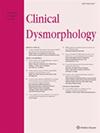约旦van den Ende-Gupta综合征家族中SCARF2新变异的鉴定及文献综述
IF 0.4
4区 医学
Q4 GENETICS & HEREDITY
引用次数: 0
摘要
本文章由计算机程序翻译,如有差异,请以英文原文为准。
Identification of a novel variant of SCARF2 in a Jordanian family with a van den Ende-Gupta Syndrome and literature review.
Introduction Van den Ende-Gupta Syndrome (VDEGS; MIM 600920) is a rare autosomal recessive syndrome caused by homozygous variants in the scavenger receptor class F member 2 (SCARF2) gene (Anastasio et al., 2010; Niederhoffer et al., 2016). SCARF2 gene is mapped to 22q11.2 region, consists of 11 exons and encodes the SCARF2. The function of SCARF2 has not been fully elucidated. It is reported that this protein belongs to the cell surface scavenger receptors family involved in lipid scavenging and other biologic processes, including pathogen clearance, endocytosis, adhesion and antigen presentation. It is further involved in the pathophysiology of several disorders, such as pathogen infections, atherosclerosis, metabolic disorders, neurodegeneration and cancer (Ishii et al., 2002; PrabhuDas et al., 2014; Zani et al., 2015).
求助全文
通过发布文献求助,成功后即可免费获取论文全文。
去求助
来源期刊

Clinical Dysmorphology
医学-遗传学
CiteScore
1.20
自引率
0.00%
发文量
64
审稿时长
6-12 weeks
期刊介绍:
Clinical Dysmorphology publishes succinct case reports on the etiology, clinical delineation, genetic mapping, and molecular embryology of birth defects. This journal covers such topics as multiple congenital anomaly syndromes - with particular emphasis on previously undescribed conditions, rare findings, ethnic differences in existing syndromes, fetal abnormalities, and cytogenetic aberrations that might give clues to the localization of developmental genes. Regular features include original, peer-reviewed articles, conference reports, book and software reviews, abstracts and summaries from the UK Dysmorphology Club, and literature summaries.
Submitted articles undergo a preliminary review by the editor. Some articles may be returned to authors wihtout further consideration. Those being considered for publication will undergo further assessment and peer-review by the editors and those invited to do so from a reviewer pool.
 求助内容:
求助内容: 应助结果提醒方式:
应助结果提醒方式:


